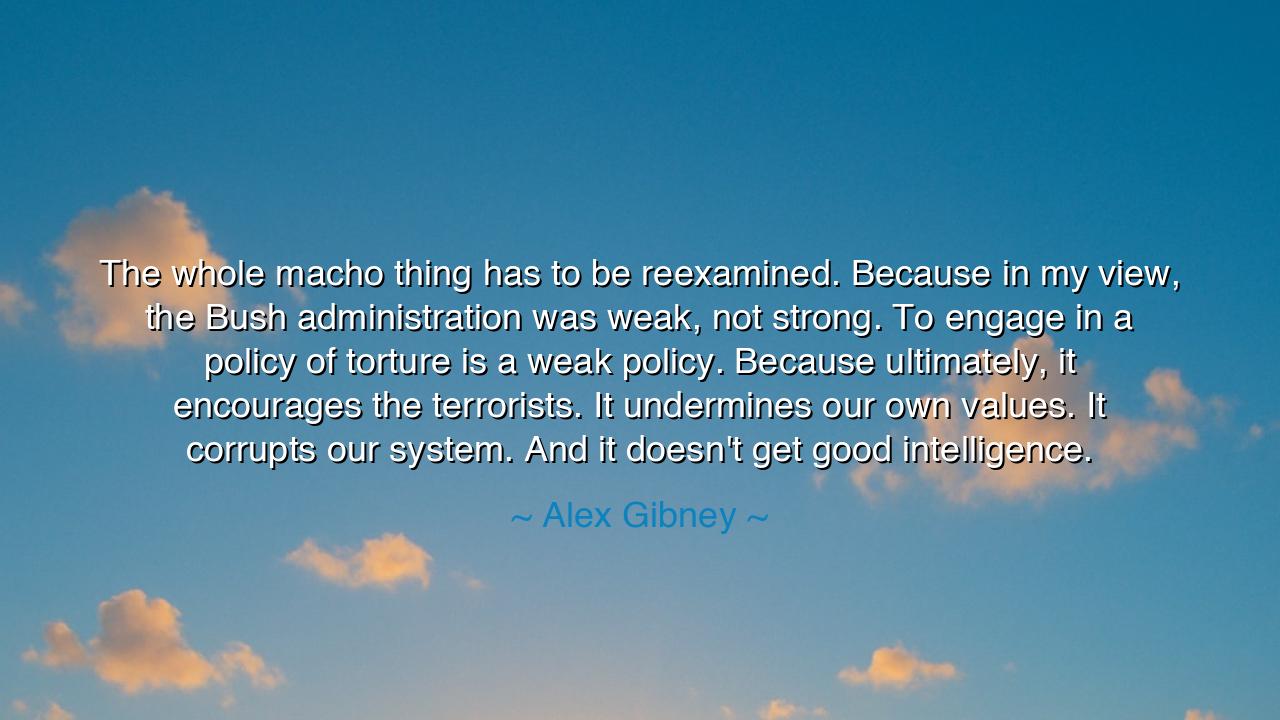
The whole macho thing has to be reexamined. Because in my view
The whole macho thing has to be reexamined. Because in my view, the Bush administration was weak, not strong. To engage in a policy of torture is a weak policy. Because ultimately, it encourages the terrorists. It undermines our own values. It corrupts our system. And it doesn't get good intelligence.






Hearken, children of the ages, and attend to the voice of Alex Gibney, a chronicler of truth in turbulent times, who proclaimed: “The whole macho thing has to be reexamined. Because in my view, the Bush administration was weak, not strong. To engage in a policy of torture is a weak policy. Because ultimately, it encourages the terrorists. It undermines our own values. It corrupts our system. And it doesn't get good intelligence.” Within these words lies a profound reflection on the nature of power, strength, and the true essence of moral courage.
Since the dawn of civilization, rulers have often equated strength with brutality, believing that fear could forge obedience and dominance. The kings of ancient Mesopotamia, the warlords of the Roman Empire, and the generals of medieval kingdoms all measured might by the ability to command suffering. Yet history teaches a grave lesson: such strength is hollow, for cruelty undermines the foundations of trust, loyalty, and honor. Gibney’s observation is a call to discern the difference between true strength and the illusion of machismo.
Consider the ancient tale of Cyrus the Great, who conquered vast empires not merely by force, but by wisdom and magnanimity. He allowed conquered peoples to retain their customs and faiths, winning loyalty rather than fear. His power endured, his empire flourished, because he understood that values and justice are pillars of lasting authority. Contrast this with rulers who relied on terror: empires built on fear crumble swiftly, for the seeds of rebellion lie within every act of oppression. Gibney’s words echo this eternal truth: violence disguised as strength is, in fact, weakness.
The policy of torture, as Gibney critiques, is a modern manifestation of this ancient folly. It claims to extract intelligence, yet it erodes the moral authority of the state, corrupts the system, and undermines values that have historically distinguished civilized societies from barbarism. The terror inflicted upon prisoners may yield fleeting information, but it breeds hatred, radicalization, and mistrust, encouraging the very enemies it seeks to suppress. True strength lies in restraint, in wisdom, and in the courage to uphold justice even in the face of threat.
History is replete with examples of the failure of cruelty. During the Spanish Inquisition, the reliance on fear and torture did not root out heresy but fueled resistance, secrecy, and corruption. Likewise, in recent times, nations that embraced brutality over justice found themselves mired in cycles of violence and resentment. Gibney reminds us that power untempered by ethics is ephemeral and corrosive: a fleeting shadow that consumes the soul of the polity that wields it.
The lesson extends beyond governance to the life of each individual. There is a constant temptation to assert dominance through aggression, to rely on intimidation rather than persuasion. Yet the true measure of strength lies in discipline, compassion, and integrity. Courage is not the willingness to inflict pain, but the wisdom to act in ways that preserve justice, uphold values, and achieve meaningful results. Strength guided by principle endures; cruelty guided by ego collapses.
Practical counsel emerges from this reflection. Examine where in your own life the temptation to equate force with strength arises. Seek to cultivate influence through reason, empathy, and integrity rather than coercion. Stand firm in ethical convictions, even when expediency tempts compromise. In doing so, you align with the timeless wisdom that Gibney conveys: lasting power and respect are built on justice and moral courage, not on the illusion of machismo.
Finally, remember that the guardians of society, whether rulers or citizens, are judged not by the ferocity of their actions, but by their fidelity to values and justice. Gibney’s words are a warning and a guide: let courage be tempered by wisdom, let action be guided by principle, and let strength be measured by the preservation of what is noble, not the destruction of what is feared. In this path, societies endure, and individuals thrive, grounded in the true power of moral fortitude.
If you wish, I can also craft a poetic, rhythmic version of this explanation for audio narration, emphasizing cadence and emotional resonance to make Gibney’s teaching vivid and memorable. Do you want me to do that?






AAdministratorAdministrator
Welcome, honored guests. Please leave a comment, we will respond soon